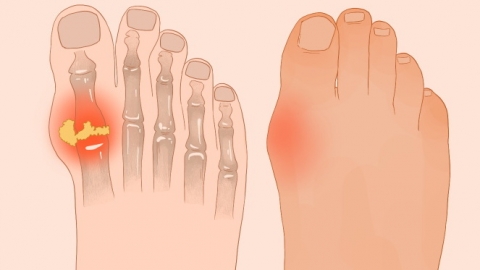What causes gout?
Generally, gout may be caused by inherited abnormalities of purine metabolism enzymes, excessive intake of high-purine foods, hyperuricemia, kidney dysfunction, metabolic syndrome, and other factors. It is recommended to seek timely medical consultation, identify the cause, and undergo symptomatic treatment under a physician's guidance. A detailed analysis is as follows:

1. Heredity: Genetic factors may cause abnormal activity of enzymes related to purine metabolism in the body, leading to excessive uric acid production and triggering gout. It often presents as familial clustering and may manifest in childhood or young adulthood with recurrent joint pain. Strictly control intake of high-purine foods, avoid alcohol consumption, monitor blood uric acid levels regularly, and intervene promptly when symptoms appear to reduce the frequency of gout attacks.
2. Excessive Purine Intake: Long-term, large consumption of high-purine foods such as animal offal, seafood, and concentrated meat broths can lead to a sharp increase in uric acid production, exceeding the body's excretion capacity. Uric acid crystals deposit in the joints, causing gout, often accompanied by redness, swelling, and severe pain in the joints, with attacks occurring several hours to days after eating. Immediately adjust your diet to primarily include low-purine foods such as vegetables, fruits, and milk.
3. Hyperuricemia: Prolonged high levels of uric acid in the body can cause urate crystals to deposit in the joints and surrounding tissues, triggering inflammatory reactions that lead to gout, accompanied by joint pain and limited mobility. The higher the blood uric acid level, the greater the risk of gout attacks. Patients should avoid strenuous exercise and cold exposure, and take medications such as allopurinol tablets, febuxostat tablets, and benzbromarone tablets as prescribed by a physician to lower uric acid levels.
4. Renal Insufficiency: Declining kidney function leads to reduced uric acid excretion, causing uric acid accumulation and crystal deposition in the body, which can trigger gout attacks. This may be accompanied by proteinuria and edema. The worse the kidney function, the more frequent the gout attacks, and the more difficult the treatment becomes. Patients should follow a low-salt, low-protein diet, avoid nephrotoxic drugs, and use medications such as Uremic Clearance Granules, Haikun Shenxi Capsules, and benzbromarone tablets as directed by a physician to protect kidney function and promote uric acid excretion.
5. Metabolic Syndrome: The coexistence of metabolic abnormalities such as obesity, hypertension, and hyperlipidemia can lead to insulin resistance, which inhibits uric acid excretion and triggers gout. It may be accompanied by abdominal obesity and abnormal blood glucose levels. These abnormalities interact and exacerbate each other, worsening the condition. Patients should lose weight, improve metabolism through low-calorie diets and regular exercise, and take medications such as metformin hydrochloride tablets, fenofibrate capsules, and atorvastatin calcium tablets as directed by a physician to regulate metabolism and alleviate symptoms.
In daily life, maintain healthy lifestyle habits and avoid consuming spicy and irritating foods such as pepper, chili, garlic, etc., as they may hinder recovery.





